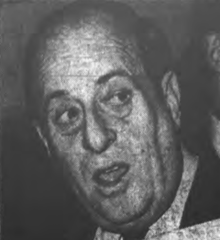Stanley Steingut
| Stanley Steingut | |
|---|---|
 |
|
| 114th Speaker of the New York State Assembly | |
|
In office January 8, 1975 – December 31, 1978 |
|
| Governor | Hugh Carey |
| Preceded by | Perry Duryea |
| Succeeded by | Stanley Fink |
| Member of the New York State Assembly from the 41st district |
|
|
In office 1967–1978 |
|
| Preceded by | Leonard E. Yoswein |
| Succeeded by | Murray Weinstein |
| Member of the New York State Assembly from the 44th district |
|
|
In office January – December 1966 |
|
| Preceded by | New district |
| Succeeded by | Bertram L. Podell |
| Member of the New York State Assembly from the 18th district |
|
|
In office 1953–1965 |
|
| Preceded by | Irwin Steingut |
| Succeeded by | District abolished |
| Personal details | |
| Born |
May 20, 1920 Crown Heights, New York City, New York |
| Died | December 8, 1989 (aged 69) New York City, New York |
| Political party | Democratic |
| Spouse(s) | Madeline Fellerman |
| Children | Robert Theodore Ilene |
| Alma mater |
Peddie School Union College St. John's University School of Law |
| Profession | Lawyer |
| Religion | Judaism |
Stanley Steingut (May 20, 1920 in Crown Heights, Brooklyn, New York City – December 8, 1989 in New York City) was an American politician, New York Democratic Party leader, insurance brokerage owner and lawyer. He took over his father's position as boss of Brooklyn County Democratic politics and eventually parlayed that position to become Speaker of the New York State Assembly. Before reaching that office, Steingut engaged in a power struggle along with Reform Democrats beginning in the early-1960s, when he was an early and powerful supporter of Robert F. Kennedy's bid for Senate from New York.In the late 1950s he was an early supporter of then Senator John F. Kennedy’s bid for the nomination of the Democratic Party for the residency. His support of both Kennedy’s caused a major rift with Tammany Hall Democrats led by then Mayor Wagner. Those loyal to Wagner combined with Rockefeller Republicans deprived him of the Speakership in 1965 even though he had a great majority of the Democratic Assemblymembers. He would not take over party leadership in the Assembly until 1969. He considered his sponsorship of landmark legislation providing public educational services for the developmentally disabled his greatest legislative accomplishment.
Political enmity did not then die out, and allegations of self-dealing began to dog him. Ultimately at the height of his political power within the Assembly, a primary challenge arose from a nearly unknown candidate. Steingut had been an ardent supporter of abortion as well as an outspoken foe of the death penalty.Although Steingut was supported by high-profile Democrats, and employed a court challenge to save his seat, he ultimately lost. He spent the rest of his life as a lawyer refusing many opportunities to trade on his relationships by engaging in lobbying.
Stanley Steingut was the son of Irwin Steingut, first generation American, himself the son an immigrant from Hamburg (Simon Steingut) who left his own prosperous family (his father and brother were bankers with their own firm in Hamburg) to emigrate to the United States sometime before 1886. Irwin Steingut worked first as a reporter and then in his father's Manhattan real estate office, before his 30-year career as New York Assemblyman from Kings County (1922-1952). During that time, he acted as minority leader from 1930 to 1934 and 1936 to 1952 and was Speaker in 1935 for the one term that Democrats had a majority in the New York Assembly during the 51 years from 1914 through 1964.
...
Wikipedia
